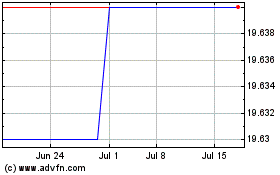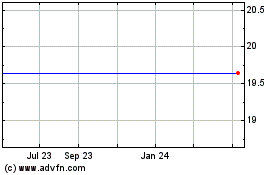As wireless growth slows, AT&T lays bet on mobile TV;
Verizon looks to Silicon Valley
By Ryan Knutson
Faced with the same saturated wireless market, the nation's two
biggest telecom companies have placed divergent bets on the
future.
With its $85 billion agreement to buy Time Warner Inc., AT&T
Inc. has turned to television while Verizon Communications Inc. has
looked to Silicon Valley, with its $4.4 billion purchase of AOL
last year and pending $4.8 billion acquisition of Yahoo Inc.
Both operators are trying to solve the same riddle -- each with
a different piece of the ill-fated 2001 merger of AOL-Time Warner.
They both have millions of wireless subscribers who pay monthly
fees to use their networks to share photos, watch videos and tap
into social networks. But that wireless business alone lacks the
means to drive growth now that the majority of Americans have a
smartphone. At the same time, their two smaller rivals are chipping
away at their subscriber base.
"They need to find a path forward for their core U.S. business
that offers something better than inexorable decline," said Craig
Moffett, an analyst at MoffettNathanson LLC. The internet, mobile
phones and smartphones fueled rapid growth, but "for the first time
in memory, there is no 'next big thing' in telecom."
AT&T's agreement to buy Time Warner doubles down on its view
that traditional television's future is mobile. Last year, it
bought satellite television business DirecTV for $49 billion,
making the former Baby Bell the country's largest pay television
provider. With Time Warner, the company would get a rich lineup of
networks like HBO, CNN and TNT plus a library of TV shows and
movies with its Warner Bros. studio that could help support a video
streaming service it is developing.
"A big customer pain point is paying for content once but not
being able to access it on any device, anywhere. Our goal is to
solve that," AT&T Chief Executive Randall Stephenson said in
statement announcing the Time Warner deal.
The strategy to bring an entertainment provider together with a
distribution network has been tried before when Comcast bought
NBCUniversal, and was part of the logic behind AOL's 2001 merger
with Time Warner. AT&T will have both satellite and mobile
subscribers to serve up Time Warner's roster of movies and popular
television programs.
Verizon, meanwhile, is building up an online advertising
business based on its 2015 acquisition of AOL. It has said it wants
to rival Facebook Inc. and Alphabet Inc.'s Google in web
advertisements and considers its Yahoo deal as a part of that
platform.
It has also invested in lesser known media companies that have
tens of millions of young followers, such as Complex Media and
AwesomenessTV. That content, which Verizon hopes will one day help
disrupt legacy media businesses, is being distributed via its
mobile video app, called go90.
"We're skating to where the puck is going," Verizon CEO Lowell
McAdam said at an industry conference last year.
Both strategies face challenges. For AT&T, DirecTV has been
losing subscribers, and cord-cutting upsets the business model Time
Warner has long relied on. Nor will it be easy for Verizon to
repair a weakened Yahoo and convince young people its video app is
worth watching.
The pressure facing the companies is intensifying. In Verizon's
third-quarter earnings, the carrier had its second straight quarter
of declining revenue after six years of growth, and suffered a net
loss of 36,000 of monthly phone subscribers. Even more monthly
wireless customers have left AT&T.
Verizon Finance Chief Fran Shammo said the amount of money
consumers are willing to pay for phone, internet and TV services
has been flat for nearly two decades, "so we have to think about a
different way to monetize our network."
Videos make up the bulk of the traffic on smartphones, but no
wireless carrier has found an effective way to make money off it.
Mobile apps like Facebook, Apple Inc.'s FaceTime and WhatsApp
destroyed carrier revenue from voice minutes and text messages, but
charging for increased data usage is hard because of intense price
competition between the four national carriers.
The carriers also face new competition from cable companies.
Comcast and Charter Communications Inc. say they plan to offer
mobile phone service, though for now that will largely be done by
reselling Verizon's connection.
Jonathan Chaplin, an analyst at New Street Research, says
AT&T and Verizon's underlying strategies are similarly seeking
to create value from their network infrastructure by adding
content.
If AT&T succeeds in acquiring Time Warner, "they will have
dramatically reduced their exposure to U.S. wireless in the space
of just a couple of years," Mr. Chaplin said. "Verizon has been
more tentative, with small acquisitions that won't hurt too much if
they turn out poorly."
Mr. Shammo said Thursday that the carrier doesn't feel the need
to do a large deal.
Last year, AT&T's Mr. Stephenson asked a group of interns at
the company's Dallas headquarters whether they paid for a monthly
TV subscription. Only one said yes and many said they used their
parents' login credentials to watch TV over the web. Mr. Stephenson
felt that showed young people wanted traditional television
packages, just delivered in a different way.
Verizon executives, finding similar trends, drew a different
conclusion.
"Millennials don't want linear TV content," said Mr. Shammo, on
a call last year with analysts. "They're disconnecting their cable
for just internet content and mobile content."
Write to Ryan Knutson at ryan.knutson@wsj.com
(END) Dow Jones Newswires
October 24, 2016 02:48 ET (06:48 GMT)
Copyright (c) 2016 Dow Jones & Company, Inc.
Altaba (NASDAQ:AABA)
Historical Stock Chart
From Mar 2024 to Apr 2024

Altaba (NASDAQ:AABA)
Historical Stock Chart
From Apr 2023 to Apr 2024
